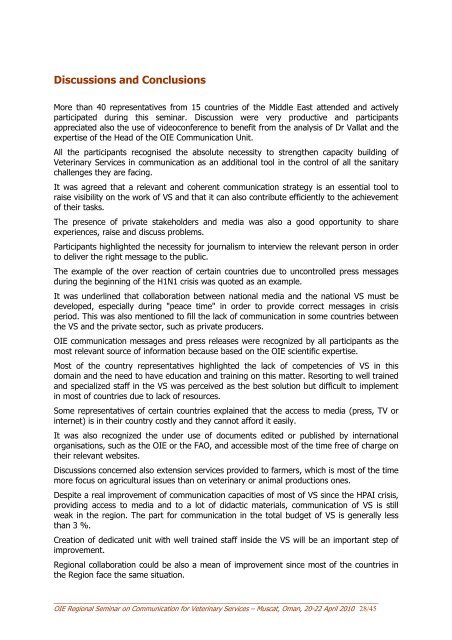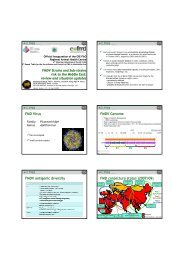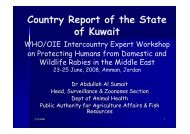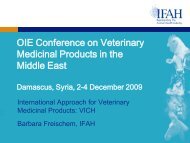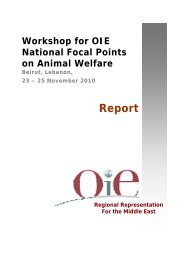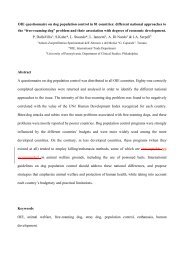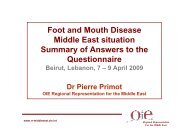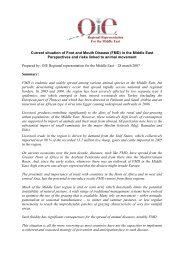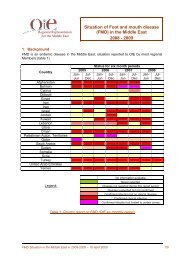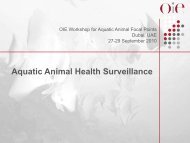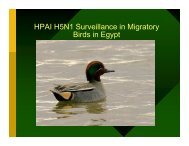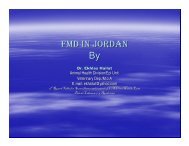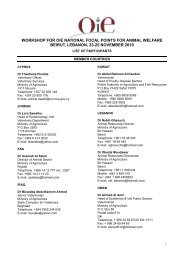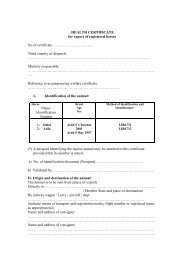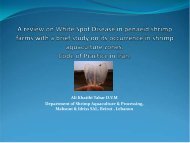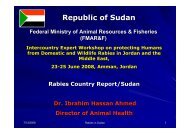Report - Middle East - OIE
Report - Middle East - OIE
Report - Middle East - OIE
Create successful ePaper yourself
Turn your PDF publications into a flip-book with our unique Google optimized e-Paper software.
Discussions and Conclusions<br />
More than 40 representatives from 15 countries of the <strong>Middle</strong> <strong>East</strong> attended and actively<br />
participated during this seminar. Discussion were very productive and participants<br />
appreciated also the use of videoconference to benefit from the analysis of Dr Vallat and the<br />
expertise of the Head of the <strong>OIE</strong> Communication Unit.<br />
All the participants recognised the absolute necessity to strengthen capacity building of<br />
Veterinary Services in communication as an additional tool in the control of all the sanitary<br />
challenges they are facing.<br />
It was agreed that a relevant and coherent communication strategy is an essential tool to<br />
raise visibility on the work of VS and that it can also contribute efficiently to the achievement<br />
of their tasks.<br />
The presence of private stakeholders and media was also a good opportunity to share<br />
experiences, raise and discuss problems.<br />
Participants highlighted the necessity for journalism to interview the relevant person in order<br />
to deliver the right message to the public.<br />
The example of the over reaction of certain countries due to uncontrolled press messages<br />
during the beginning of the H1N1 crisis was quoted as an example.<br />
It was underlined that collaboration between national media and the national VS must be<br />
developed, especially during "peace time" in order to provide correct messages in crisis<br />
period. This was also mentioned to fill the lack of communication in some countries between<br />
the VS and the private sector, such as private producers.<br />
<strong>OIE</strong> communication messages and press releases were recognized by all participants as the<br />
most relevant source of information because based on the <strong>OIE</strong> scientific expertise.<br />
Most of the country representatives highlighted the lack of competencies of VS in this<br />
domain and the need to have education and training on this matter. Resorting to well trained<br />
and specialized staff in the VS was perceived as the best solution but difficult to implement<br />
in most of countries due to lack of resources.<br />
Some representatives of certain countries explained that the access to media (press, TV or<br />
internet) is in their country costly and they cannot afford it easily.<br />
It was also recognized the under use of documents edited or published by international<br />
organisations, such as the <strong>OIE</strong> or the FAO, and accessible most of the time free of charge on<br />
their relevant websites.<br />
Discussions concerned also extension services provided to farmers, which is most of the time<br />
more focus on agricultural issues than on veterinary or animal productions ones.<br />
Despite a real improvement of communication capacities of most of VS since the HPAI crisis,<br />
providing access to media and to a lot of didactic materials, communication of VS is still<br />
weak in the region. The part for communication in the total budget of VS is generally less<br />
than 3 %.<br />
Creation of dedicated unit with well trained staff inside the VS will be an important step of<br />
improvement.<br />
Regional collaboration could be also a mean of improvement since most of the countries in<br />
the Region face the same situation.<br />
_______________________________________________________________________________________<br />
<strong>OIE</strong> Regional Seminar on Communication for Veterinary Services – Muscat, Oman, 20-22 April 2010 28/45


